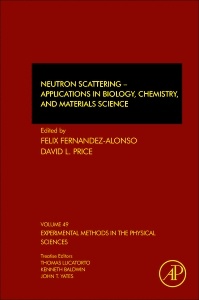Description
Neutron Scattering – Applications in Biology, Chemistry, and Materials Science
Experimental Methods in the Physical Sciences Series
Coordinators: Fernandez-Alonso Felix, Price David L
Language: English
Subjects for Neutron Scattering – Applications in Biology...:
Support: Print on demand
Description
/li>Contents
/li>Readership
/li>Biography
/li>Comment
/li>
Neutron Scattering: Applications in Chemistry, Materials Science and Biology, Volume 49, provides an in-depth overview of the applications of neutron scattering in the fields of physics, materials science, chemistry, biology, the earth sciences, and engineering.
The book describes the tremendous advances in instrumental, experimental, and computational techniques over the past quarter-century. Examples include the coming-of-age of neutron reflectivity and spin-echo spectroscopy, the advent of brighter accelerator-based neutron facilities and associated techniques in the United States and Japan over the past decade, and current efforts in Europe to develop long-pulse, ultra-intense spallation neutron sources.
It acts as a complement to two earlier volumes in the Experimental Methods in the Physical Science series, NeutronScattering: Fundamentals(Elsevier 2013) and Neutron Scattering: Magnetic and Quantum Phenomena (Elsevier 2015).
As a whole, the set enables researchers to identify aspects of their work where neutron scattering techniques might contribute, conceive the important experiments to be done, assess what is required, write a successful proposal for one of the major facilities around the globe, and perform the experiments under the guidance of the appropriate instrument scientist.
2. Dynamics of biological systems
3. Water and aqueous media
4. Ionic liquids
5. Sorbate dynamics in zeolite catalysts
6. Catalysis
7. Atomic quantum dynamics in materials research
8. Soft condensed matter
9. Ionic conductors and protonics
10.High-temperature levitated materials
11.High-pressure science
12.Engineering applications
Graduate students and researchers in academia and industry in the areas of physics, chemistry, materials science, and biology
Dr. Fernandez-Alonso’s current research interests focus on the development and subsequent exploitation of neutron scattering techniques in physical chemistry, with particular emphasis on materials-chemistry challenges of relevance to societal needs and long-term sustainability. These include gas and charge storage in nanostructured media, molecular and macromolecular intercalation phenomena, and solid-state protonics. He has approximately 100 refereed publications and is currently involved in several neutron instrumentation projects at ISIS and abroad.
David L. Price obtained a Ph.D. in Physics from Cambridge University under the supervision of G. L. Squires. He has subsequently had a 40-year career in research and administration involving neutron and x-ray experiments and facilities. After a postdoctoral appointment at the High-Flux Beam Reactor (HFBR) at Brookhaven National Laboratory, he joined the staff at Argonne National Laboratory where he served variously as Senior Scientist, Director of the Solid-State Science Division and Director of the Intense Pulsed Neutron Source (IPNS) during its construction and commissioning phases. He later joined Oak Ridge National Laboratory as Executive Director of the High-Flux Isoto
- Completes a three-volume set, providing extensive coverage on emerging and highly topical applications of neutron scattering
- Addresses the increasing use of neutrons by chemists, life scientists, material scientists, and condensed-matter physicists
- Presents up-to-date reviews of recent results, enabling readers to identify new opportunities and plan neutron scattering experiments in their own field
These books may interest you

Neutron Scattering 193.44 €



